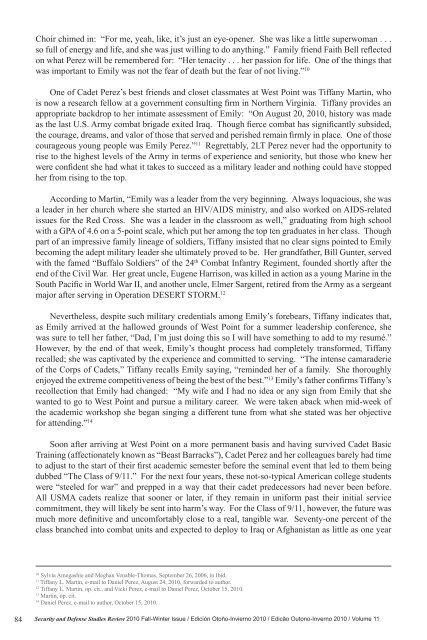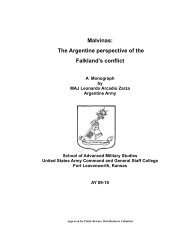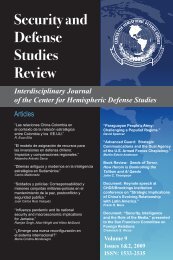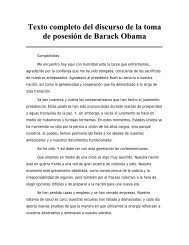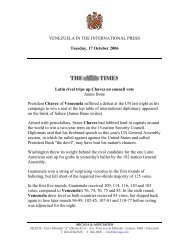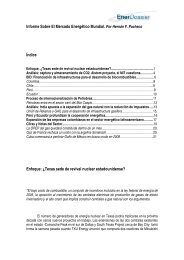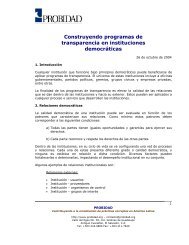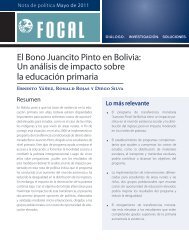Choir chimed in: “For me, yeah, like, it’s just an eye-opener. She was like a little superwoman . . .so full of energy <strong>and</strong> life, <strong>and</strong> she was just willing to do anything.” Family friend Faith Bell reflectedon what Perez will be remembered for: “Her tenacity . . . her passion for life. One of the things thatwas important to Emily was not the fear of death but the fear of not living.” 10One of Cadet Perez’s best friends <strong>and</strong> closet classmates at West Point was Tiffany Martin, whois now a research fellow at a government consulting firm in Northern Virginia. Tiffany provides anappropriate backdrop to her intimate assessment of Emily: “On August 20, <strong>2010</strong>, history was madeas the last U.S. Army combat brigade exited Iraq. Though fierce combat has significantly subsided,the courage, dreams, <strong>and</strong> valor of those that served <strong>and</strong> perished remain firmly in place. One of thosecourageous young people was Emily Perez.” 11 Regrettably, 2LT Perez never had the opportunity torise to the highest levels of the Army in terms of experience <strong>and</strong> seniority, but those who knew herwere confident she had what it takes to succeed as a military leader <strong>and</strong> nothing could have stoppedher from rising to the top.According to Martin, “Emily was a leader from the very beginning. Always loquacious, she wasa leader in her church where she started an HIV/AIDS ministry, <strong>and</strong> also worked on AIDS-relatedissues for the Red Cross. She was a leader in the classroom as well,” graduating from high schoolwith a GPA of 4.6 on a 5-point scale, which put her among the top ten graduates in her class. Thoughpart of an impressive family lineage of soldiers, Tiffany insisted that no clear signs pointed to Emilybecoming the adept military leader she ultimately proved to be. Her gr<strong>and</strong>father, Bill Gunter, servedwith the famed “Buffalo Soldiers” of the 24 th Combat Infantry Regiment, founded shortly after theend of the Civil War. Her great uncle, Eugene Harrison, was killed in action as a young Marine in theSouth Pacific in World War II, <strong>and</strong> another uncle, Elmer Sargent, retired from the Army as a sergeantmajor after serving in Operation DESERT STORM. 12Nevertheless, despite such military credentials among Emily’s forebears, Tiffany indicates that,as Emily arrived at the hallowed grounds of West Point for a summer leadership conference, shewas sure to tell her father, “Dad, I’m just doing this so I will have something to add to my resumé.”However, by the end of that week, Emily’s thought process had completely transformed, Tiffanyrecalled; she was captivated by the experience <strong>and</strong> committed to serving. “The intense camaraderieof the Corps of Cadets,” Tiffany recalls Emily saying, “reminded her of a family. She thoroughlyenjoyed the extreme competitiveness of being the best of the best.” 13 Emily’s father confirms Tiffany’srecollection that Emily had changed: “My wife <strong>and</strong> I had no idea or any sign from Emily that shewanted to go to West Point <strong>and</strong> pursue a military career. We were taken aback when mid-week ofthe academic workshop she began singing a different tune from what she stated was her objectivefor attending.” 14Soon after arriving at West Point on a more permanent basis <strong>and</strong> having survived Cadet BasicTraining (affectionately known as “Beast Barracks”), Cadet Perez <strong>and</strong> her colleagues barely had timeto adjust to the start of their first academic semester before the seminal event that led to them beingdubbed “The Class of 9/11.” For the next four years, these not-so-typical American college studentswere “steeled for war” <strong>and</strong> prepped in a way that their cadet predecessors had never been before.All USMA cadets realize that sooner or later, if they remain in uniform past their initial servicecommitment, they will likely be sent into harm’s way. For the Class of 9/11, however, the future wasmuch more definitive <strong>and</strong> uncomfortably close to a real, tangible war. Seventy-one percent of theclass branched into combat units <strong>and</strong> expected to deploy to Iraq or Afghanistan as little as one year10Sylvia Amegashie <strong>and</strong> Meghan Venable-Thomas, September 26, 2006, in Ibid.11Tiffany L. Martin, e-mail to Daniel Perez, August 24, <strong>2010</strong>, forwarded to author.12Tiffany L. Martin, op. cit., <strong>and</strong> Vicki Perez, e-mail to Daniel Perez, October 15, <strong>2010</strong>.13Martin, op. cit.14Daniel Perez, e-mail to author, October 15, <strong>2010</strong>.84<strong>Security</strong> <strong>and</strong> <strong>Defense</strong> <strong>Studies</strong> <strong>Review</strong> <strong>2010</strong> <strong>Fall</strong>-Winter Issue / Edicíón Otoño-Invierno <strong>2010</strong> / Edicão Outono-Inverno <strong>2010</strong> / Volume 11
following graduation. 15 Of course, the U.S. <strong>Defense</strong> Department’s prohibition against women officersjoining the traditional combat arms—infantry, armor, field artillery—meant that Emily, Tiffany, <strong>and</strong>the other female members of the class were branched primarily into the combat support <strong>and</strong> combatservice support arms (e.g., Martin chose Military Intelligence). Nevertheless, modern warfare of thetype so prevalent in the 21 st century, fueled by an asymmetric, non-conventional threat, resulted in ablurring of the lines between the so-called “frontline” combat troops <strong>and</strong> those supposedly in safersupport roles. The fate of Emily <strong>and</strong> scores of other women officers in Southwest Asia proves thatthere is no clear-cut front line any longer. All soldiers are in harm’s way <strong>and</strong> subject to being targetedby an enemy that does not adhere to the accepted rules of war.According to Martin, while at West Point, Emily continued to excel. Majoring in sociology, sheenjoyed singing in the Gospel Choir <strong>and</strong> participating on the women’s track team in such events asthe 100-meter <strong>and</strong> 200-meter sprints, the triple jump, <strong>and</strong> the 4x100-meter relay. During infrequentbreaks from the rigors of the Academy, Emily loved to spend time with her family <strong>and</strong>, in particular,her nephews. “They were the object of her intense affection, <strong>and</strong> her room <strong>and</strong> computer were filledwith pictures bearing their images.” 16 Emily was also a member of STARS, a tutoring program, <strong>and</strong>was a co-founder of the West Point Dance Team. She was also a member of the Officers of ChristianFellowship. 17“Though challenges rose in abundance,” Martin insists, “Emily never quit. One of her greatesttraits was tenacity,” a word that continually surfaces in descriptions of Perez. Part of what made herthe confident person she epitomized was her strong faith. “Her inspiration in life <strong>and</strong> her courageto do the right thing stemmed from her belief in God, <strong>and</strong> her belief that she could be a catalyst forchange. She believed in leading from the front, leading by example, <strong>and</strong> she honestly yearned forno earthly rewards, but heavenly ones.” 18 This author can add how important religion is to WestPoint cadets. At the time he attended the Academy, m<strong>and</strong>atory chapel for all cadets was still ineffect, as it had been for virtually the entire history of the school, but in the early 1970s the policywas reversed as a result of a series of legal challenges. M<strong>and</strong>atory chapel was abolished about threeyears before the first women arrived in 1976. Yet, as witnessed by the author who returned in thelate 1970s to serve on the faculty for three years, a large number of cadets still were attending chapelregularly, joining the various choirs, serving as Sunday School teachers, <strong>and</strong> voluntarily participatingin other religion-based extracurricular activities. Religious faith, though justifiably separated fromgovernment service in the U.S., is considered a vital component of being a good soldier <strong>and</strong> a solidcitizen by an overwhelming majority of West Point cadets <strong>and</strong> graduates.One of the challenges faced by Cadets Perez <strong>and</strong> Martin was being two of only a couple hundredwomen at the Academy. The proportion of female cadets—generally in the 12 percent to 18 percentrange for most recent classes—is far below the proportion of women in the U.S. population, <strong>and</strong>even within the U.S. Army at large. Women are still a distinct minority at all the U.S. federal serviceacademies. Emily overcame this seeming disadvantage by rising to become the Sergeant Major ofthe Beast Barracks cadre, then Brigade Sergeant Major, Regimental Sergeant Major <strong>and</strong>, finally, thefirst female minority member ever to hold the position of Comm<strong>and</strong> Sergeant Major of the entireCorps of Cadets, 19 itself around 4,000 strong. Emily leaned heavily on support from two of herrole models—Comm<strong>and</strong> Sergeant Major Mary Sutherl<strong>and</strong> <strong>and</strong> her replacement, Comm<strong>and</strong> SergeantMajor Michael Bergman—“each of whom took Emily under their wing <strong>and</strong> provided her professional<strong>and</strong> personal mentorship <strong>and</strong> guidance.” Martin went on to observe that Emily also adored her fatherDaniel, the dedicated Army NCO, whom she had grown up emulating. According to Martin, “Emily15Gibbs <strong>and</strong> Thornbaugh, Time, p. 30.16Martin, e-mail to Daniel Perez, August 24, <strong>2010</strong>.17Martin, e-mail to author, August 26, <strong>2010</strong>.18Martin, e-mail to Daniel Perez, August 24, <strong>2010</strong>.19Ibid.<strong>Security</strong> <strong>and</strong> <strong>Defense</strong> <strong>Studies</strong> <strong>Review</strong> <strong>2010</strong> <strong>Fall</strong>-Winter Issue / Edicíón Otoño-Invierno <strong>2010</strong> / Edicão Outono-Inverno <strong>2010</strong> / Volume 11 85
- Page 2 and 3:
Security and Defense Studies Review
- Page 4 and 5:
CommentariesSecurity Cooperation Be
- Page 6:
6Security and Defense Studies Revie
- Page 9 and 10:
El espacio de las mujeres en las Fu
- Page 11 and 12:
La organización e institucionaliza
- Page 14 and 15:
encuentra altamente asociada al cam
- Page 16 and 17:
ministerial para la equidad de gén
- Page 19 and 20:
BibliografíaBarrancos, Dora (2007)
- Page 21 and 22:
Anexo IPaísIncorporación Femenina
- Page 23:
Anexo IIMujeres militares sudameric
- Page 26:
Todo un conjunto de cualidades, cap
- Page 29:
500 y durante la Batalla de Sarand
- Page 32 and 33:
miembros de la soberanía de la Nac
- Page 34 and 35: 10 de octubre de ese año, la Compa
- Page 36 and 37: algunos barcos de apoyo para alberg
- Page 38 and 39: 1.75 metros de altura y como requis
- Page 40 and 41: de producción sustituyendo al homb
- Page 42 and 43: y sicológica, no sólo en los ámb
- Page 44 and 45: La segunda etapa se caracterizó po
- Page 46 and 47: Sin embargo, las preguntas acerca d
- Page 48 and 49: La normativa vinculada con la asign
- Page 50 and 51: conductas que pudieran encuadrarse
- Page 52 and 53: Género en el marco de las Operacio
- Page 54 and 55: ecordar que las ciencias sociales y
- Page 56 and 57: 56Security and Defense Studies Revi
- Page 58 and 59: De ese modo nos encontramos con mod
- Page 60 and 61: escala descendente de la oficialida
- Page 62 and 63: del total. Debe destacarse que dent
- Page 64 and 65: BibliografíaCarreiras, H.: Gender
- Page 66 and 67: Tras la aprobación de esta histór
- Page 68 and 69: Una vez aprobada la Resolución 132
- Page 70 and 71: para designar asesores de género e
- Page 73 and 74: firme se ha materializado en la ado
- Page 76 and 77: la construcción de la paz, la reco
- Page 78 and 79: Sin embargo, a medida que avanzaba
- Page 81 and 82: Women on the Front Lines of the Fig
- Page 83: term even has meaning any longer wi
- Page 87 and 88: including members from other Americ
- Page 89 and 90: Solidariedade ou interesse? O que l
- Page 91 and 92: em mais amplo e complexo. 7A possib
- Page 93 and 94: Participação dos Estados-Membros
- Page 95: sujeitos a alguma OMP. Aqueles que,
- Page 98 and 99: às recomendações das Fases II, I
- Page 100 and 101: Franco, que assumira após o Impeac
- Page 102 and 103: O Brasil, por intermédio do Presid
- Page 104 and 105: No entanto, no tocante especificame
- Page 106 and 107: Portanto, não se consegue visualiz
- Page 108 and 109: ReferênciasAlmeida Pinto, J.R. de;
- Page 110 and 111: ______. United Nations Department o
- Page 112 and 113: Beyond economic activities, the PRC
- Page 114 and 115: soy oil into the country, a flow wh
- Page 116 and 117: As is the case with Chinese investm
- Page 118 and 119: In some cases, Chinese companies, l
- Page 120 and 121: Although it is not possible to pred
- Page 122 and 123: Considering this, we will now go fr
- Page 124 and 125: The contribution of Chilean troops
- Page 126 and 127: within and outside the nation?3. Ho
- Page 128 and 129: 128Security and Defense Studies Rev
- Page 130 and 131: 130Security and Defense Studies Rev
- Page 132 and 133: the Iran-Contra affair, one of the
- Page 134 and 135:
all American hostages were released
- Page 136 and 137:
“As he frequently said with pride
- Page 138 and 139:
making operation 48 was conducted s
- Page 140 and 141:
secret army alongside skilled profi
- Page 142 and 143:
public than Kelly, taking issue wit
- Page 144 and 145:
Some conservatives, even within the
- Page 146 and 147:
opponents that he was “getting pr
- Page 148 and 149:
for Defense (SUBDEF)—could initia
- Page 150 and 151:
Hence, our countries are showing a
- Page 152 and 153:
I am referring to Ibero-American Su
- Page 154 and 155:
Thus, our country has agreed to the
- Page 156 and 157:
sustraer mi producción intelectual
- Page 158 and 159:
hombres (22,288).• Inclusión. Al
- Page 160 and 161:
La perspectiva de trabajar en el di
- Page 162 and 163:
162Security and Defense Studies Rev
- Page 164 and 165:
assignment on the U.S. Secretary of
- Page 166 and 167:
las Operaciones de Paz se abren a u
- Page 168 and 169:
ConclusiónA modo de conclusión, u
- Page 170 and 171:
170Security and Defense Studies Rev
- Page 172 and 173:
offering insight into political ter
- Page 174 and 175:
goods, and skilled labor must all b
- Page 176 and 177:
country” like North Korea. To be
- Page 178 and 179:
178Security and Defense Studies Rev
- Page 180 and 181:
views of women, in effect disabling
- Page 182 and 183:
Marine Col. William T. Hewes’ arg
- Page 184 and 185:
19. Hughes, Melanie M. (2007) “Un
- Page 186 and 187:
MacEoin. Commonweal 14: 8-11.This i
- Page 188 and 189:
37. Sans Echaìniz, María. (1992)
- Page 190 and 191:
47. Woodward, Rachel, and Patricia
- Page 192 and 193:
elucidativos das dificuldades que e
- Page 194 and 195:
194Security and Defense Studies Rev
- Page 196 and 197:
of an integrated Canadian company i
- Page 198 and 199:
198Security and Defense Studies Rev
- Page 200 and 201:
stated it would rightfully infringe
- Page 202 and 203:
First, through an examination of de
- Page 204 and 205:
204Security and Defense Studies Rev
- Page 206 and 207:
impact on the reader, by acknowledg
- Page 208 and 209:
To the Editor:Kevin P. Newmeyer’s
- Page 210 and 211:
Whitney Hoft was a Center for Hemis
- Page 212 and 213:
The transformation of the role of w
- Page 214 and 215:
en Puerto Rico, esta soldada resume
- Page 216 and 217:
Deconstruyendo a Ollie: Cómo los c
- Page 218:
Center for Hemispheric Defense Stud


